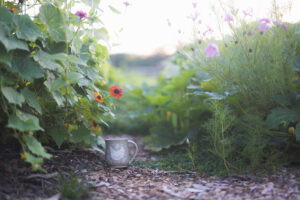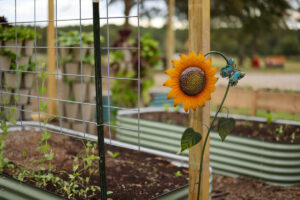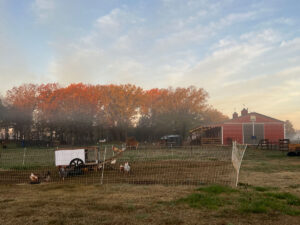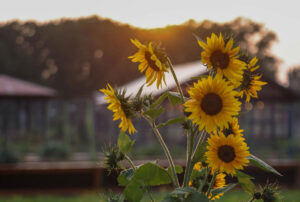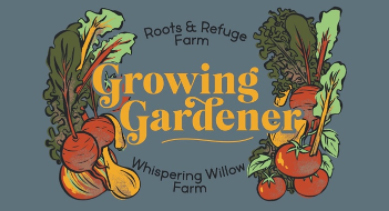Lemon balm syrup (known as honey medicine in our home) has many health benefits. Making this simple recipe helps with suppressing a cough, calming anxiety, and even sweetening your lemonade.
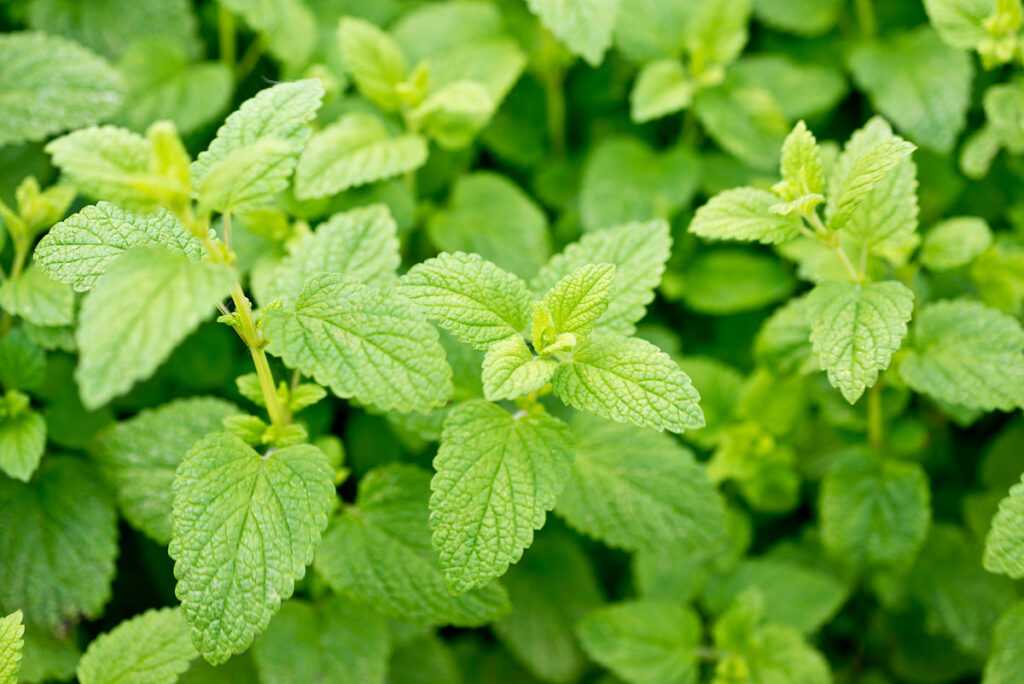
Harvesting a few lemon balm leaves will make a simple tea, and adding some local raw honey will create a beneficial syrup.
What is Lemon Balm?
Lemon balm is a cooking and medicinal herb from the mint family.
In my opinion, this wonderful herb smells like Lemon Head hard candy. Just rub the leaf and you will get that lemony aromatic smell.
Lemon balm will grow around 2 feet tall and will spread aggressively. You can only use so much lemon balm, and you don’t want your garden overgrown with it.
Lemon balm is a perennial crop in warmer climates and an annual crop in colder climates. You can read about garden planning basics to gain a better understanding of your climate and growing seasons.
Benefits of Lemon Balm
Lemon balm is known as a calming herb. This herb is beneficial in promoting sleep, relieving stress and anxiety, easing upset tummies, cutting down bloating, and aiding in digestion.
It's important to note that I am not a certified medical practitioner, and this post is not intended to diagnose or treat but is for informational purposes only. Please contact your medical care professional before introducing new herbal remedies into your wellness routine.
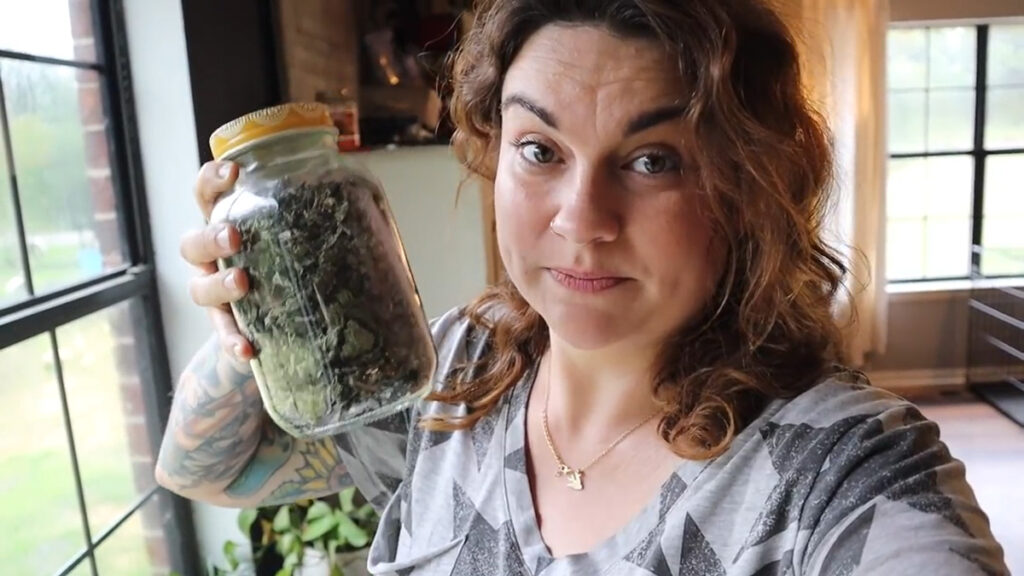
Ways to Use Lemon Balm and Lemon Balm Syrup
Adding lemon balm to your diet is healthy and simple. Eaten fresh or dried, lemon balm will add flavor to any dish.
- Cooking – Using lemon balm in your recipes is an easy and delicious way to add it to your diet. Putting it in fresh salads adds a zesty lemon flavor. It's a great seasoning to put on fish and chicken as well. Here is my go-to chicken dinner.
- Tea – Drinking cold or hot lemon balm tea is beneficial if added to a daily routine. Pro Tip: Making a cold lemon balm garden tea is simple. Just pick leaves from the garden, steep the leaves in hot boiling water, and add lemon balm syrup or raw local honey for sweetness.
- Lemon Balm Syrup – Lemon balm syrup (honey medicine is what we call it) is very versatile. This sweet elixir can be taken daily to boost the immune system. Add it to your teas and lemonades as a sweetener with the extra benefits of soothing upset tummies or calming anxieties naturally. Because of the honey in the lemon balm tea, we use it as a cough suppressant. Have a hard time getting to sleep? Take a teaspoon of lemon balm syrup (aka honey medicine) as a sleep aid.
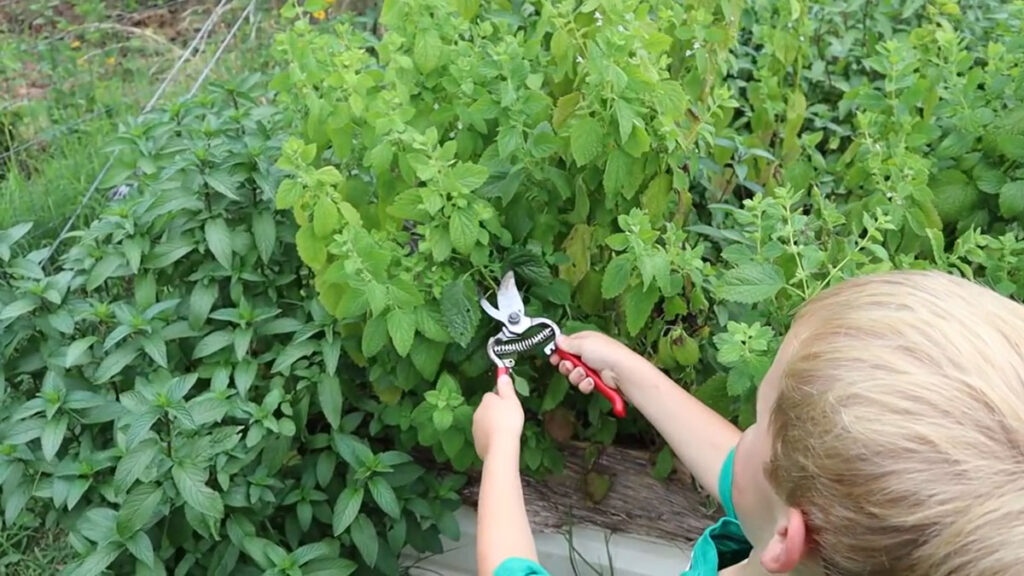
Harvesting and Preserving Lemon Balm
Harvest lemon balm when the plant is just starting to produce flower buds. This is when the plant has the highest concentration of oils. The first harvesting of lemon balm will give you the sweetest flavoring.
You may be able to get a second or third harvest depending on where you live and when it was planted.
When harvesting fresh lemon balm to use right away, simply pick the number of leaves that are needed to flavor your cooking or teas.
When harvesting for preservation, pick about 2/3 of the plant stem with leaves. Doing this will allow for new growth to be fuller and stronger.
When the stems and leaves are cut, hang them upside down to dry.
Store dried leaves in a sealed container for winter. This will allow you to have lemon balm on hand for cooking, teas and lemon balm syrup at all times of the year.
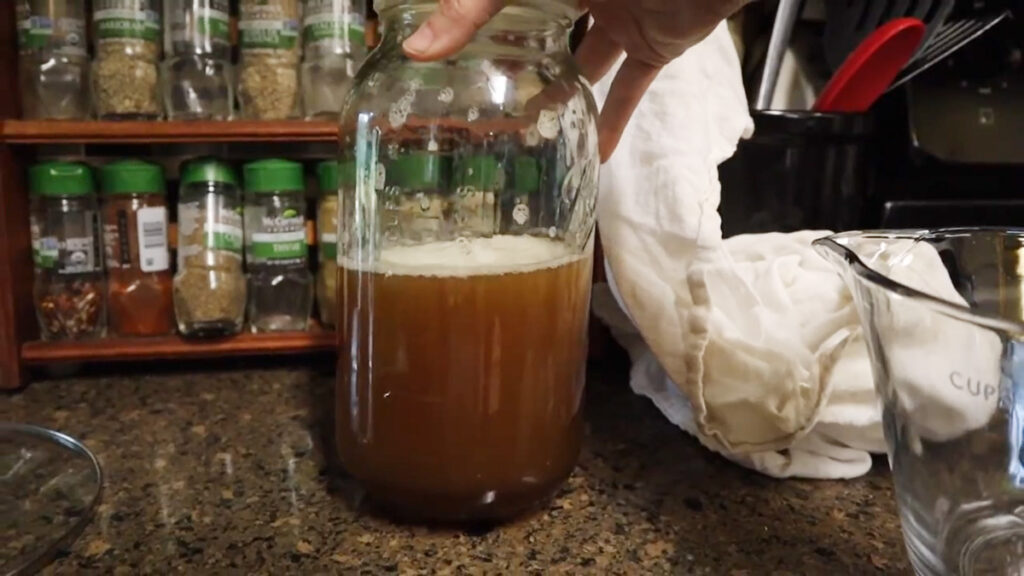
How to Make Lemon Balm Syrup
Supplies Needed
It just takes a few supplies to make this beneficial honey medicine.
- Stove – A kitchen stove is the easiest heat source, but you could always use a wood stove to bring water to a boil.
- Strainer – A strainer or colander is needed to strain the leaves from the syrup.
- Pot – Any pot, pan, or tea kettle to boil water is sufficient.
- Glass Jar or Weck Jar and Lids – Jars and lids are needed to store your lemon balm syrup (including storing dried lemon balm). I do a lot of canning with weck jars so they are around the house already.
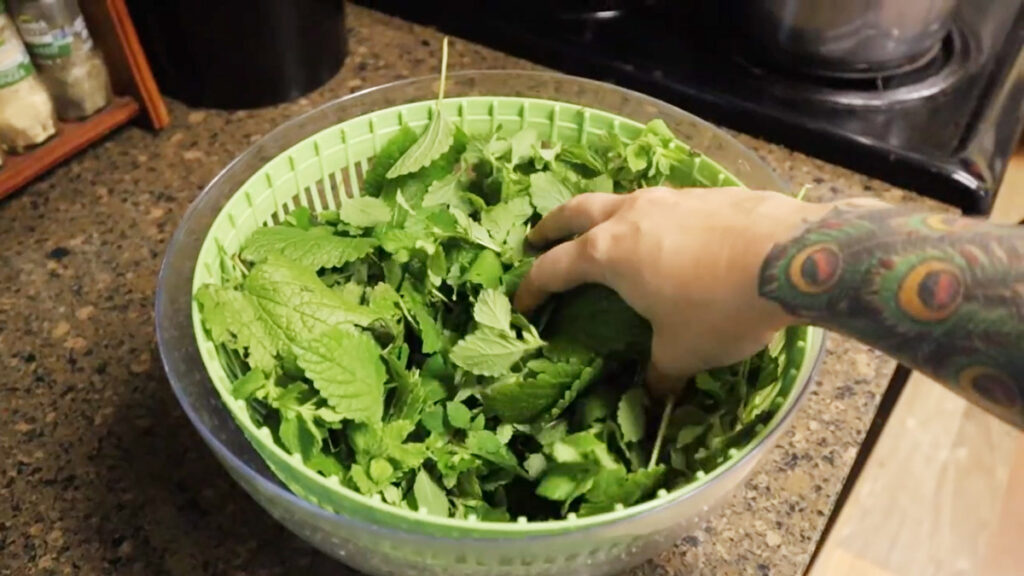
Ingredients Needed
- 2 Cups Lemon Balm Leaves – If using dried lemon balm leaves, use ½ cup.
- 5 Cups of Water – Boiling water is needed to pull the oils and nutrients out of the lemon balm leaves.
- 1 ½ Cups Local Raw Honey – Just like knowing where your food comes from it's also great to know where your honey comes from, locally. Using local raw honey is the best because it is not processed, it is unpasteurized, and contains local enzymes and pollen. These local occurring enzymes and pollens could help build up immunities to seasonal allergies. Local raw honey is also a great cough suppressant and is a natural sweetener for our lemon balm syrup. Do not give honey to children under a year old because it could contain clostridium botulinum which is dangerous to their underdeveloped digestive systems.
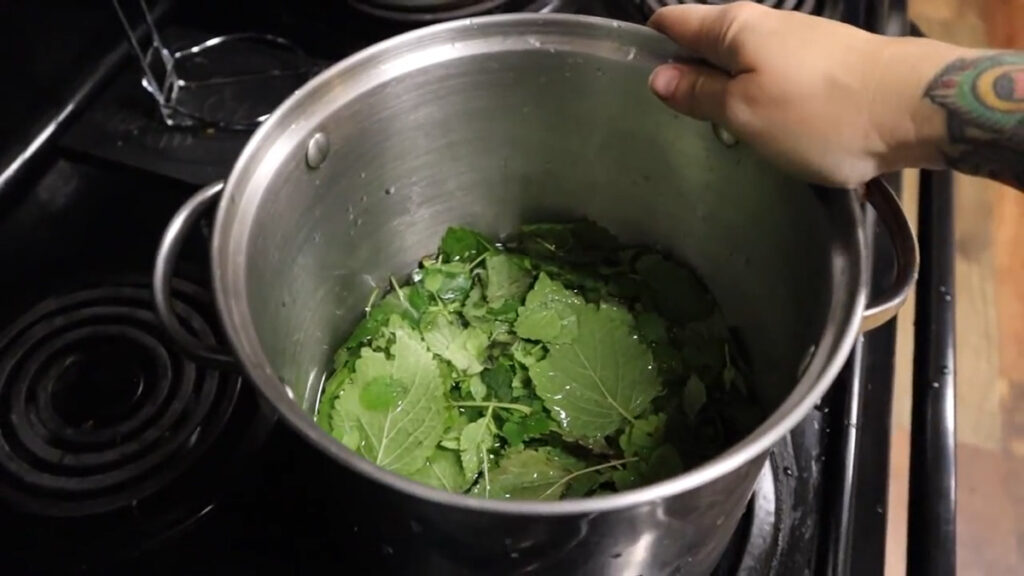
Directions
- Rinse fresh lemon balm leaves, and remove the stems.
- Put lemon balm leaves at the bottom of the pan.
- Add the water, and make sure the leaves are completely covered.
- Over medium heat, bring the water to a boil.
- Cover the pan partially.
- Turn down the heat and let simmer for about 30 minutes; stirring occasionally to make a lemon balm tea.
- Take the lemon balm tea and pour it through a strainer, removing all the leaves out of the liquid tea.
- Return to the heat and allow it to reduce down to about 3 cups of tea.
- Let tea cool before pouring over honey (boiling water will break down the beneficial enzymes of the raw honey).
- Pour local raw honey at the bottom of a storage jar.
- Pour the tea into the jar with the local raw honey, and stir until completely combined. This will make a lemon balm simple syrup mixture. It will be thin and not have a thick syrup texture.
- For enhanced flavor, add lemon juice or ginger.
- Lemon balm syrup will last a few weeks in the fridge in an airtight container. Pro Tip: Because we have a large family, we go through it quickly. To ensure it doesn’t go to waste, we put in teas and lemonades as a sweetener. If you aren’t able to go through it as fast as we do, freezing the syrup is another easy way to store for later use.
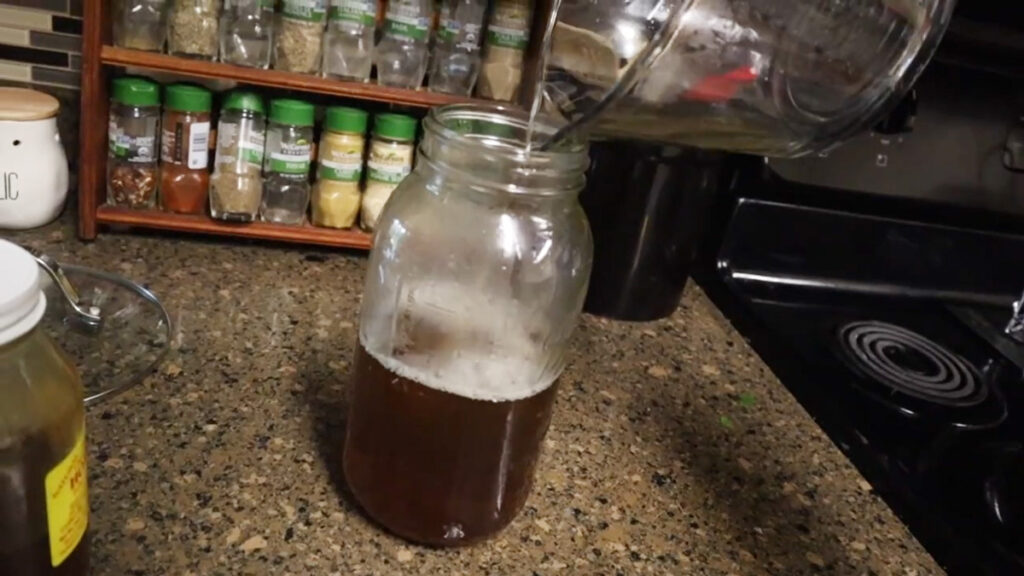
More Natural Home Remedies
- Natural Remedy to Treat A Cough at Home
- How to Make Elderberry Syrup
- How to Make Bone Broth – A Simple Homemade Recipe
- Homemade Fire Cider Recipe – Herbal Cold Remedy
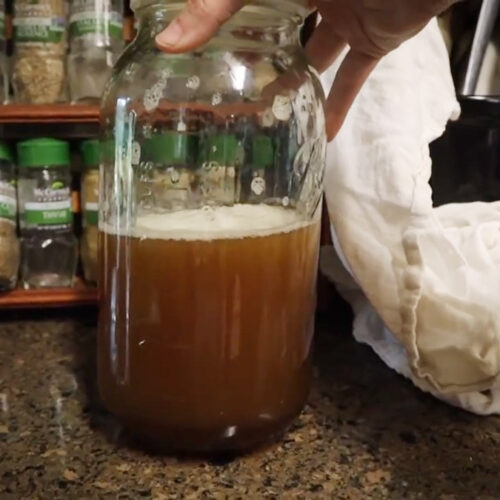
Simple Lemon Balm Syrup Recipe
Ingredients
- 2 cups lemon balm leaves
- 5 cups water
- 1 1/2 cups raw honey local is best
Instructions
- Rinse fresh lemon balm leaves, and remove the stems.
- Put lemon balm leaves at the bottom of the pan. Add the water, and make sure the leaves are completely covered.
- Over medium heat, bring the water to a boil. Cover the pan partially.
- Turn down the heat and let simmer for about 30 minutes, stirring occasionally to make a lemon balm tea.
- Take the lemon balm tea and pour it through a strainer, removing all the leaves out of the liquid tea.
- Return to the heat and allow it to reduce down to about 3 cups of tea.
- Let tea cool before pouring over honey (boiling water will break down the beneficial enzymes of the raw honey).
- Pour local raw honey into a jar.
- Pour the tea into the jar with the local raw honey and stir until completely combined. For enhanced flavor, add lemon juice or ginger.
- Lemon balm syrup will last a few weeks in the fridge in an airtight container.
Video
Notes
- Because we have a large family, we go through this amount of syrup quickly. To ensure it doesn’t go to waste, we add it to tea and lemonade as a sweetener.
- If you aren’t able to go through it as fast as we do, freezing the syrup is another easy way to store it for later use.

